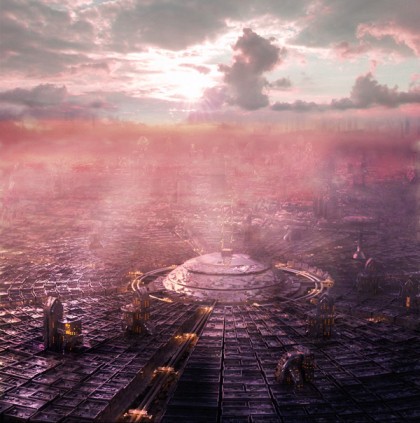Protopia
[Translations: Japanese]
Every utopia is a fiction, with necessary flaws that prevent it from ever becoming real. I don’t believe in utopias. Particularly technological ones. (That doesn’t stop critics from accusing me of being a technological utopian.) My aversion to utopias goes even deeper. I have not met a utopia I would even want to live in.

[Circular buildings = utopia, image from 3D Utopia]
I don’t have to worry about that nightmare because utopias are impossible. Yet dystopias, their dark opposites, are possible, though unlikely. Dystopias are certainly fascinating, and a lot more entertaining than most utopias. There are also much easier to envision. Who can’t imagine an apocalyptic last-man-on-earth world, or a world run by robot overseers, or a disintegrating megacity, or simple armageddon? There are endless possibilities of how the modern civilization collapses. (See my previous post on Collapsitarians). But just because dystopias are cinematic and dramatic, and much easier to imagine, that does not make them much more likely.
The flaw in most dystopian narratives is that they are not sustainable. They flash chaos, but then quickly self-organize. The outlaws and underworlds that seem so exciting at “first demise” are quickly taken over by organized crime and militants, so the lawlessness becomes racketeering, and over very little time, racketeering becomes a type of corrupted government — all to maximize the income of the bandits. In a sense rapid greed rapidly cures dystopias. Real dystopias are more like the old Soviet Union, or Libya, rather than Mad Max or Bladerunner: they are stifling bureaucratic rather than lawless. Ruled by fear, their society is hobbled except for the benefit of a few, but like the pirates at sea (see The Invisible Hook) there is far more law and order than not. In fact in real broken societies, the outrageous outlawry we associate with dystopias are not permitted. The big bandits keep the small bandits to a minimum.
I think our destination is neither utopia nor dystopia nor status quo, but protopia. Protopia is a state that is better than today than yesterday, although it might be only a little better. Protopia is much much harder to visualize. Because a protopia contains as many new problems as new benefits, this complex interaction of working and broken is very hard to predict.
Today we’ve become so aware of the downsides of innovations, and so disappointed with the promises of past utopias, that we now find it hard to believe even in protopia — that tomorrow will be better than today. We find it very difficult to imagine any kind of future we would want to live in. Name a single science fiction future that is both plausible and desirable?
No one wants to move to the future today. We are avoiding it. We don’t have much desire for life one hundred years from now. Many dread it. That makes it hard to take the future seriously. So we don’t take a generational perspective. We’re stuck in the short now. We also adopt the Singularity perspective: that imagining the future in 100 years is technically impossible. So there is no protopia we are reaching for.
It may be that this future-blindness is simply the inescapable affliction of our modern world. Perhaps at this stage in civilization and technological advance, we enter into permanent and ceaseless future-blindness. Utopia, dystopia, and protopia all disappear. There is only the Blind Now.
That is possible. But I am hoping that our current future-blindness is only a passing phase and that we will again begin to generate plausible visions of a desirable future, ones that are slightly better than today. These protopian visions won’t be as thrilling as either dystopias or utopias, but they might be thrilling enough to aim towards.


